Hangover 101: How To Cure A Hangover



You knew you shouldn’t have had that last glass of wine or bottle of beer at the end of the night. Now, your body is giving you a pretty painful reminder of your over-indulgence the evening before. You might feel queasy, dizzy, thirsty or shaky. Your head might hurt, and you might just want to crawl back into bed, pull the covers over your head and sleep for as long as possible.
In short, you’ve got a hangover, a group of symptoms that occur after you’ve had a few too many alcoholic drinks. Symptoms of a hangover vary from person to person and might even vary from hangover to hangover. There’s also no surefire way to predict whether or not drinking alcohol is going to lead to a hangover. You might wake up feeling fine the next day, or you might not.
Knowing what to do to prevent and reduce the symptoms of a hangover can help you enjoy your evening without worrying about the morning after.
Ways To “Cure” A Hangover
Whether you had a few too many margaritas during Cinco de Mayo or drank a bottle of wine at a friend’s wedding, you’re facing a nasty hangover today. Since you can’t turn back the clock, your best option is to find a way to get some relief from your symptoms. While there’s no one best cure for a hangover, doing one or a combination of the following might help you feel better:
- Boost your nutrients: Vitamins and minerals might help to reduce the symptoms of your hangover. One study suggested that taking 1,200 mg of vitamin B6 before, during and after drinking helped to minimize hangover signs. One way to get more nutrients into your body quickly is through IV therapy. The Myers’ Cocktail is an especially popular hangover remedy. It contains ingredients such as B complex, B12, saline, vitamin C, magnesium, zinc and the amino acid glutathione to help reduce feelings of fatigue, rehydrate the body and boost the immune system.
- Take medicine: Popping a pain-relieving pill, such as aspirin or ibuprofen, can help to ease achiness in your body, such as a headache or body aches, after a night of over-indulgence. Just be careful about the medicine you take. Acetaminophen (aka Tylenol) is a no-no after drinking, due to the potential for liver damage. Ibuprofen, aspirin or naproxen are better bets, as they help to reduce inflammation in the body. If you’ve got a tummyache or indigestion, too, try chewing an antacid to get some relief.
- Drink water or sports drinks: Although studies show that electrolyte levels among hungover and non-hungover people are pretty similar, it’s a good idea to keep your body hydrated as you bounce back from a hangover. Drink plenty of plain water throughout the day, or if you feel you need a little extra boost, try sports drinks or coconut water. It’s a particularly good idea to drink water or other hydrating fluids if you’ve had vomiting or diarrhea as a result of your hangover, as both can make you more dehydrated.
- Sleep it off: If the only thing you want to do when you have a hangover is to go back to bed, go right ahead and do it. One of the best things for a hangover is time, so if you can go to bed and fall asleep, you might wake up to find that your hangover has worked itself out.
- Eat something: Greasy food is not the way to go if you want to alleviate hangover symptoms. Instead, eat bland food that won’t upset your stomach and that will help to replenish nutrients. Your best bet is to follow the “BRAT” diet when you’re hungover. Eat bananas, rice, applesauce and toast, as they are easy on the digestive system, help to restore blood sugar levels and won’t make you feel queasy.
- Skip the hair of the dog: Some people claim that the best way to get rid of a hangover is to drink some more. The phrase “the hair of the dog” comes from a belief that drinking a potion with the hair of a rabid dog that bit a person was the best way to cure rabies. Drinking another beer, a mimosa or a bloody Mary the morning after will help you to stay buzzed, momentarily dulling your symptoms. But it’s not going to do anything to get rid of the hangover itself.
How To Prevent A Hangover In The First Place
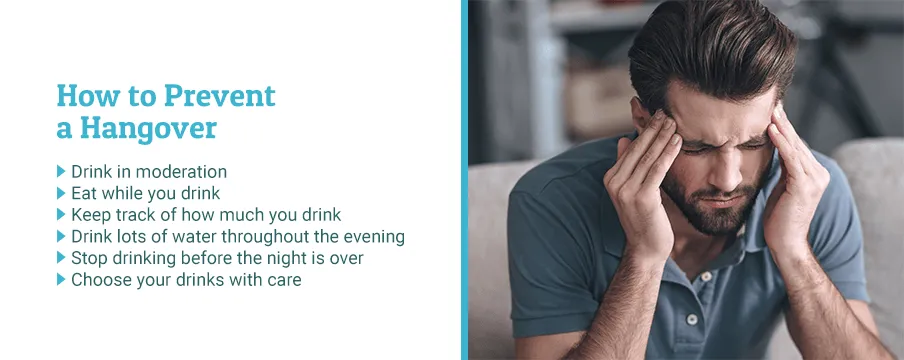


While there’s no surefire cure for a hangover, there is a surefire way to prevent one — don’t drink alcohol in the first place. Of course, there might be times when you do want to have a drink or two to celebrate a milestone occasion or an accomplishment. But celebrations don’t always have to equal misery the next day. There are a few things you can to prevent a hangover or reduce the symptoms you experience.
- Drink in moderation: You’re less likely to have physical hangover symptoms the next day if you drink in moderation. A moderate amount of alcohol is one drink per day for women and two drinks per day for men. Women might see symptoms of a hangover after having three drinks in a night, while men might have symptoms after five or more drinks. A “drink” is a five-ounce pour of wine, a 1.5-ounce shot of liquor or a 12-ounce bottle of 5% beer, so some “drinks” might actually be more than one, depending on their size and alcohol percentage.
- Eat while you drink: Drinking on a full stomach helps to slow down the rate at which your body absorbs alcohol. If possible, enjoy a meal before you start drinking to lessen the effects of a hangover the next day. Your next best option is to eat food while you’re drinking. For example, order a meal with your beer or snack on some cheese while sipping wine.
- Keep track of how much you drink: When you’re out with friends or at a party, it can be easy to lose track of how much you’ve had to drink. That’s especially the case if you and a group of friends are taking turns buying rounds. One way to keep track of your drinks is to order bottles or cans and keep them on the table as you go. Another option is to open a tab at the bar for yourself and ask the bartender what you order count is every time you go up to order. If you’re going to a party or a restaurant that’s BYOB, bring along the exact amount you want to drink, such as two bottles of beer. Once your drinks are gone, you know you’re finished for the night.
- Drink lots of water throughout the evening: Drinking water or other non-alcoholic drinks throughout the evening helps you avoid a hangover in a couple of ways. First, alternating wine, beer or spirits with a glass of water keeps you hydrated. Second, having a soft drink after each alcoholic beverage helps you drink less. If you would typically have four beers, you can end up having just two if you drink two glasses of water in between.
- Stop drinking before the night is over: Your body needs time to process the alcohol you’ve consumed. If you keep drinking right up until last call, you’re going to be more likely to feel hungover the next day compared to someone who stops drinking at 11 p.m. As a general rule, it takes your liver about one hour to metabolize one ounce of alcohol. Giving your body plenty of time to metabolize the alcohol you’ve consumed will help you feel better tomorrow.
- Choose your drinks with care: A drink is a drink, right? Not when it comes to hangovers. Some drinks, such as whiskey, red wine and brandy, contain higher amounts of c than others. Congeners are chemical compounds that can break down into toxic chemicals such as formic acid and formaldehyde in the body. They’re known for making hangovers a lot more severe. If you want a more comfortable morning after, stick to light-colored spirits, such as vodka and gin, as well as light-colored beer and wine.
What Causes a Hangover in the First Place?
It’d be a lot easier to treat hangovers or avoid them in the first place if they were caused by one thing. Instead, hangovers tend to be caused by a variety of factors, all coming together to make the day after a big night out a bit of a challenge. The most important thing to understand about the cause of hangovers is that it’s the alcohol itself that causes them. Although you can feel tired, nauseous and worn out for a variety of reasons, you only tell people that you’ve got a hangover if you’ve been drinking alcohol sometime in the recent past.
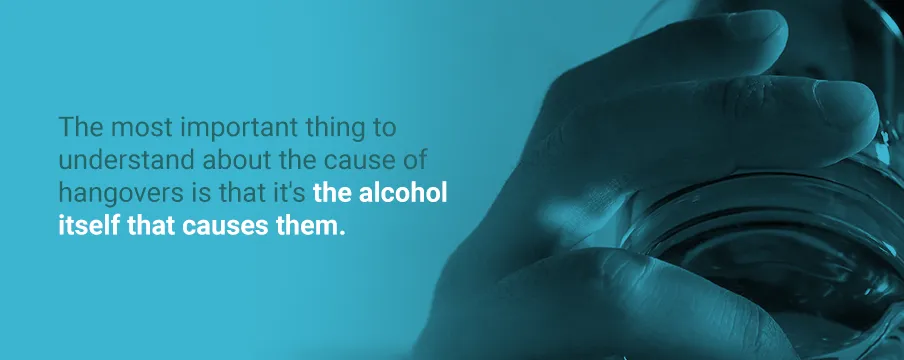


The various effects alcohol can have on your body often come together to create the perfect storm that leads to a hangover. When you drink beyond moderate levels, you’re likely to experience the following:
- Low blood sugar: When you drink alcohol, your body reacts by increasing the amount of insulin it produces. Over time, alcohol’s effects on your insulin levels and the effectiveness of insulin can lead to high blood sugar. In the short term, consuming alcohol tends to lead to low blood sugar. A drop in blood sugar levels can make you feel shaky, weak, and tired, all symptoms associated with being hungover.
- Inflammation: Another cause of a hangover can be an inflammatory response throughout your body. Your immune system produces molecules called cytokines. Some fight inflammation while some trigger it. When you drink, your body tends to produce more of the pro-inflammatory cytokines. The inflammatory effects of alcohol seem to be why anti-inflammatories, such as ibuprofen and B vitamins, help to minimize the symptoms of a hangover.
- Irritation of the digestive system: If you’re the type of person to experience stomach or gastrointestinal upset after a night of heavy drinking, it’s probably the alcohol’s fault. Alcohol increases the production of stomach acid, which can make your tummy hurt. Food might stay in your stomach longer as well thanks to alcohol, contributing to discomfort.
- Dehydration: While alcohol itself doesn’t dehydrate you, it does make you have to pee more often as it’s a diuretic. Every gram of alcohol you consume increases your body’s urine excretion by 10 ml. When you’re peeing a lot, your body is more likely to become dehydrated. And dehydration can make you feel dizzy and thirsty. It can also make your head hurt.
- Sleep disruption: You might feel sleepy when you drink, but alcohol also affects the quality of sleep you get. Drinking a lot of alcohol helps you fall into a deep sleep but keeps you from moving into the rapid-eye-movement (REM) stage of sleep. The REM stage is the more restful stage. Without it, you’re likely to wake up the next day feeling tired and out-of-sorts.
- Vasodilation: Vasodilation is a fancy way of saying that alcohol makes your blood vessels wider, so that blood flows more easily through them. Wider blood vessels can give you a headache. People who are susceptible to migraines might also notice that drinking triggers a migraine the next day.
Hangover Symptoms and What Makes Some Hangovers Worse Than Others
How do you know when you have a hangover? If you went out drinking the night before and wake up feeling bad, you’re likely dealing with a hangover, rather than something like a stomach bug or the flu. Hangovers typically don’t start until the day after you were drinking, as they don’t begin until your blood alcohol content is near zero
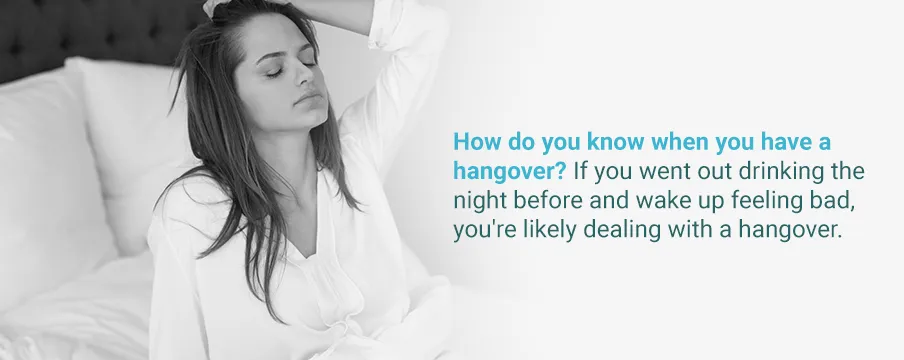


Common symptoms of a hangover include:
- Feeling sick to your stomach, including vomiting
- Feeling tired
- Dry mouth or excess feelings of thirst
- Shakiness
- Poor sleep the night before
- Trouble concentrating
- Feeling irritable or anxious
- Dizziness
- Sensitivity to sound and light
- Headache
- Muscle aches
- Fast heartbeat
Some hangovers can be way worse than others. For example, you might wake up after having a bottle of red wine with a mouth that feels like it’s stuffed with cotton, an upset stomach and a pounding headache. Meanwhile, the morning after you had a bottle of white wine, you might wake up with a mild headache and no other symptoms. The type of drink you consume can affect the type of hangover you have.
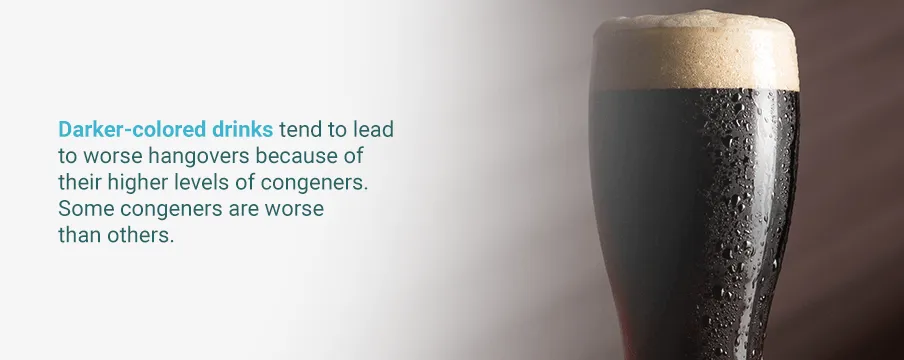


Darker-colored drinks tend to lead to worse hangovers because of their higher levels of congeners. Some congeners are worse than others. For example, methanol tends to hang around in the body long after other alcohol-related compounds have been eliminated. Whiskey and red wine tend to have the highest levels of methanol, so if you drink either, you’re likely to have a hangover that hangs around.
Some people are also more susceptible to hangovers than others. Your age, sex and genetic makeup can all influence whether or not you’re likely to be hung over the day after a big bash. The older you are, the more likely you are to report symptoms after a night of drinking.
Women might also be more likely to have hangover symptoms than men. One study of more than 1,200 undergraduates asked them to rate how they experienced 13 hangover symptoms. Female respondents tended to report having worse experiences with the symptoms than male respondents.
There are a few reasons why a woman might have a worse hangover than a man. Women tend to weigh less than men and usually have less body water than men, which can make them more likely to feel the effects and after-effects of alcohol.
Finally, genetics can affect how a person’s body processes alcohol and the severity of their hangover. People from Japan, China or Korea are more likely to be intolerant to alcohol than people from other parts of the world due to a genetic mutation. In the body, aldehyde dehydrogenase 2 (ALDH2), an enzyme, turns acetaldehyde, a substance produced by alcohol, into acetic acid, aka vinegar. Often, people from East Asia have a mutation that affects the ALDH2 enzyme, making it either inactive or less active. When the enzyme doesn’t do its job, acetaldehyde builds up in the blood, making hangover symptoms worse. A common sign of alcohol intolerance is skin that turns red soon after a person drinks.
Should You See a Doctor About a Hangover?
Although a hangover can seem like an emergency that needs medical treatment, for the most part, symptoms resolve on their own after about 24 hours. There are cases, though, when your symptoms might seem bad enough to warrant a doctor’s visit. Or, you might be concerned if you have hangovers pretty often or experience symptoms almost daily.
If you experience hangover symptoms more than just occasionally, you might be worried about the overall effects of alcohol on your life. Should you have symptoms often enough that you struggle to do your work or have noticed a decline in your overall quality of life, you might want to speak with a doctor. A medical professional can work with you to help you cut back on the amount you drink or help you stop drinking entirely.
There are some instances when drinking a lot of alcohol can result in an emergency. Alcohol poisoning is not the same thing as a hangover. It’s a serious issue that needs immediate medical attention. Some signs that a person is experiencing alcohol poisoning include:
- Acting disoriented or confused
- Irregular breathing or very slow breathing
- Seizures
- Losing consciousness and not being able to wake up again
- Blue or excessively pale skin
- Very low body temperature
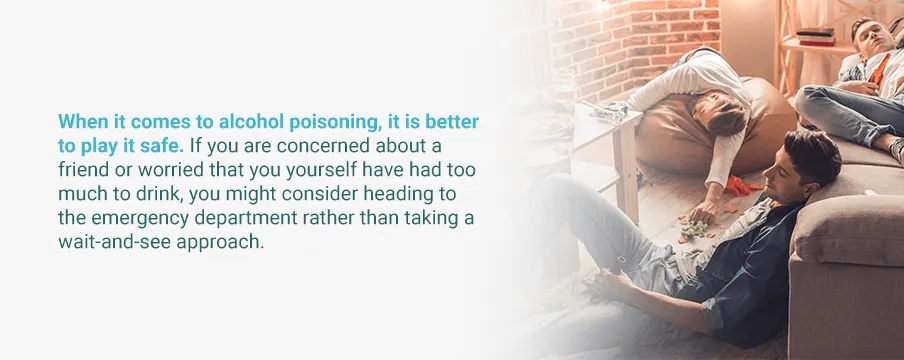


When it comes to alcohol poisoning, it is better to play it safe. If you are concerned about a friend or worried that you yourself have had too much to drink, you might consider heading to the emergency department rather than taking a wait-and-see approach. A medical professional can assess the situation and help you get the appropriate, potentially life-saving treatment.
Get Help for Your Hangover Symptoms
Have too much to drink last night? There’s no need to spend your morning and afternoon wallowing in misery. Westside Wellness offers in-home IV hydration vitamin therapy to help you feel better. We provide supervised Hangover Rescue IV Vitamin Therapy to help with all of your hangover symptoms. You don’t have to get yourself up and to a hospital to get the vitamins and minerals you need to help you bounce back.
When you call, a registered nurse from our team will get to know you and your needs, learn more about your medical history and recommend an appropriate treatment and come to your home to administer the IV treatment for your hangover.
Things are rough enough when you have a hangover. In-home IV therapy makes life a little easier. To learn more about your options and how to alleviate your symptoms, contact us today.



We’ve all been there – waking up after a night of indulgence with a pounding headache, fatigue, and an overall sense of discomfort. Hangovers can put a damper on our productivity and well-being. However, there’s a revolutionary solution that promises a quick recovery: IV in a bottle for hangover relief. In this post, we will explore how an IV hangover can help you before and after drinking to recover from a hangover and get back to feeling your best.
Understanding Hangovers and Recovering from a Hangover
A hangover occurs due to excessive alcohol consumption, which leads to dehydration, electrolyte imbalance, and nutrient depletion in the body. Symptoms such as headache, nausea, fatigue, and brain fog can make even the simplest tasks challenging. While there are various remedies and folk remedies for hangover recovery, the effectiveness varies from person to person.
The Rise of IV Drips for Hangover Relief
IV drink for hangover drips have gained significant popularity in recent years as a fast and efficient way to bounce back from a night of heavy drinking. These IV in a bottle for hangover delivers a blend of fluids, vitamins, minerals, and electrolytes directly into the bloodstream, bypassing the digestive system. This method ensures rapid absorption and replenishment of essential nutrients, providing relief from hangover symptoms and promoting overall recovery.
IV drip before drinking:
For those who want to be proactive in preventing hangovers, some wellness centers and clinics offer IV drips specifically designed to be administered before drinking alcohol. These IV drip before drinking drips are formulated to hydrate the body, boost nutrient levels, and prepare it for the potential stress caused by alcohol. By providing a foundation of hydration and essential nutrients, pre-drinking IV drips aim to minimize the severity of hangover symptoms the next day. This is why so many have opted for this convenient IV drink for hangover treatment.
IV Drips for Recovering from a hangover: Hangover how to recover: If you find yourself waking up with a hangover, IV drips for hangover recovery can be a game-changer. These specialized IV drips are designed to address the specific needs of your body during a hangover. The blend of fluids, electrolytes, vitamins, and minerals work together to rehydrate your body, replenish depleted nutrients, and alleviate hangover symptoms.
The Benefits IV drink for hangover
- Rapid Rehydration: Dehydration is a common culprit behind hangover symptoms. IV hangover drips provide relief in a direct and rapid method of rehydration. By infusing fluids directly into the bloodstream, IV drips bypass the digestive system and ensure that your body receives the hydration it needs quickly.
- Nutrient Replenishment: Excessive alcohol consumption can deplete essential nutrients in your body. IV hangover drips deliver relief with a potent blend of vitamins, minerals, and electrolytes that help restore nutrient balance. This replenishment can help alleviate symptoms like fatigue and brain fog, giving you a much-needed energy boost.
- Symptom Relief: Hangover symptoms can be debilitating, affecting your ability to function and enjoy your day. IV drips for hangover recovery aim to alleviate these symptoms by targeting the root causes. By providing hydration and essential nutrients, IV drips can help reduce headache intensity, nausea, and overall discomfort.
- Convenience: IV in a bottle for hangover relief offers the convenience of a ready-to-use solution. With pre-packaged IV drips, you can easily administer the treatment in the comfort of your own home. This convenience eliminates the need to travel to a clinic or wait for an appointment, saving you time and providing relief when you need it most.IV hangover relief has emerged as a game-changer for those seeking a quick recovery from a night of excessive drinking.
